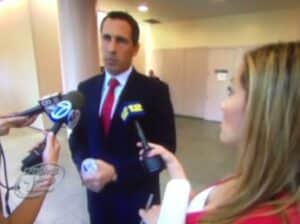Long Island Criminal Mischief Attorney
Experienced Criminal Mischief Lawyers in Long Island, NY

While criminal mischief charges may be seen as “less” criminal compared to charges like trespassing or robbery, a conviction can still have life-changing repercussions for defendants and might even result in felony charges. Being convicted of criminal mischief in New York can result in a prison sentence and/or paying a hefty fine.
If you or a loved one has been charged with criminal mischief on Long Island, NY, it is important to get the help of an experienced Long Island criminal mischief lawyer. You don’t have to face your charges alone. At Edward Palermo Criminal Defense, top-rated Long Island criminal defense attorney Edward Palermo has helped many individuals navigate the complicated Long Island, NY criminal justice system. We may be able to help you understand your rights under the law and explore your legal options. Contact us today at (516) 280-2160 or (631) 265-1052 to schedule a complimentary consultation with one of our attorneys.
How Does the Law Define Criminal Mischief?
Under New York law, criminal mischief is defined as recklessly or intentionally causing damage to another person’s property without permission. While state laws may differ in the interpretation of the charges, criminal mischief is mainly involved in penalizing the destruction of property, regardless if it is public or privately owned.
There have been several instances where teens or young adults participate in online trends which involve seemingly inconspicuous or non-violent pranks which consequently result in criminal charges. In 2021, a TikTok trend called ‘devious licks’ resulted in several criminal mischief charges against individuals who engaged in stealing or hiding school equipment for engagement. While the trend can be considered low compared to other criminal acts, the cost of replacing the school equipment as well as the encouragement of potentially criminal behavior prompted law enforcement to cite the people responsible.
In New York, charges of criminal mischief have the following elements:
Reckless or Intentional
Accidental damage to property is not considered criminal mischief. If the property damage is caused by recklessness, especially a conscious disregard for the consequences of one’s actions, it will be considered an act of criminal mischief.
As an example, if a person were playing baseball and the ball smashes their neighbor’s window, it could be considered an accident rather than if the person were actively aiming at the neighbor’s house. In the second act, the person would have had to ignore the chances of breaking their neighbor’s windows which would constitute reckless behavior.
Other acts can include egging someone’s house or vehicle, destroying another person’s phone, or keying a person’s vehicle.
Another’s Property
As you are responsible for your property, destroying it would not be considered a crime. However, for property that is not your own (e.g. leased, rented, or co-owned) damages may constitute criminal mischief. For example, if a spouse destroys their partner’s game console or an expensive computer due to an argument, they may be liable for criminal mischief. The value of the person’s property is also considered when determining the charges for criminal mischief.
Permission or Consent
The person owning the property must not have consented or given permission to the damage to their property. For example, if the property owner consented to the creation of a mural or graffiti on their property, it would not be considered criminal mischief.
It is important to remember that while criminal mischief may seem trivial at first, the acts of distributing computer viruses, destroying telephone lines to prevent people from calling emergency hotlines, and tampering with fire exits are also considered criminal mischief. A criminal conviction can have severe repercussions on a person’s relationships and career. Repeated instances of criminal mischief can also result in felony charges.
If you or a loved one has been charged with criminal mischief, do not leave the matter of your defense to chance. Edward Palermo, a top-rated Long Island criminal mischief attorney, understands the impact getting a conviction can have. At Edward Palermo Criminal Defense, we provide quality legal counsel and representation. We take our time in working with our clients and establishing a personalized strategy that would best suit their interests. Our skilled Long Island criminal mischief attorneys are available for consultation.
Contact us today at (516) 280-2160 or (631) 265-1052 or fill out our online form to schedule yours.
Criminal Mischief Charges and Penalties in Long Island, NY
Criminal mischief is penalized by degrees depending on whether the defendant has had previous convictions or the magnitude of the damage the act has caused. Aside from the penalties required under the law, a judge may compel a defendant to pay restitution. An award for restitution goes to the victim to pay for the damages. A judge may also compel a defendant to personally fix or clean up the damage or mess they caused to the property.
Criminal Mischief in the Fourth Degree
A person is considered to be guilty of the crime of criminal mischief in the fourth degree when they, with the intent to damage the property of another person without the person’s consent:
- Intentionally damage another person’s property
- Intentionally participate in the destruction of an abandoned property
- Recklessly damage another person’s property valued at an amount greater than $250
- Intentionally disabling or removing phone or similar connections to prevent a person from seeking emergency assistance or preventing the person from seeking help from a third party. (ex. In domestic violence cases where a person would destroy their partner’s phone)
Criminal mischief in the fourth degree is a Class A Misdemeanor. Punishment involves a maximum one-year prison sentence, probation of up to three years, restitution, and/or a $1,000 fine.
Criminal Mischief in the Third Degree
A person is considered to be guilty of the crime of criminal mischief in the third degree when they, with the intent to damage the property of another person without the person’s consent:
- Damage and break into a motor vehicle while it is locked with the intent to steal property and within the previous ten year period, have been convicted three or more times of separate instances of criminal mischief,
- Intentionally damage property valued at an amount of more than $250
Criminal mischief in the fourth degree is a Class E felony. Punishment involves a maximum four-year prison sentence, probation of up to five years, restitution, and/or a fine of more than $250 but not exceeding $1,500.
Criminal Mischief in the Second Degree
A person is considered to be guilty of the crime of criminal mischief in the second degree when they intentionally damage another person’s property valued at more than $1,500 without the person’s consent.
Criminal mischief in the fourth degree is a Class D felony. Punishment involves a maximum seven-year sentence in state prison, restitution, and significant fines.
Criminal Mischief in the First Degree
A person is considered to be guilty of the crime of criminal mischief in the first degree when they intentionally damage the property of another person, without the person’s consent, and with the use of an explosive.
Criminal mischief in the fourth degree is a Class B felony. Punishment involves a maximum 25-year sentence in state prison, restitution, and significant fines.
Associated Crimes and Offenses to Criminal Mischief in NY
Like criminal mischief, the following charges under the NY Penal Law may involve similar elements of intentional or reckless damage to property:
- Vandalism
- Cemetery desecration
- Reckless endangerment of property
- Unlawfully posting advertisements
- Tampering with a consumer product
- Making graffiti
- Possession of graffiti instruments
- Littering on road tracks or right of way
How a Long Island Criminal Defense Attorney Can Help

If the defendant lacked the intent to cause damage or the damage caused was accidental, the defendant had the permission of the owner to destroy the property, or the value of the damaged property did not exceed the required amount, charges of criminal mischief may be dismissed.
Depending on the circumstances of the case, it may also be possible to reduce felony charges to a misdemeanor. A conviction of criminal mischief, while considered a non-violent felony and crime in New York, can still have grave consequences on a person’s life. It can damage a person’s reputation and affect their personal and professional relationships.
If you or a loved one has been charged with criminal mischief on Long Island, NY, getting the help of an experienced criminal defense attorney is crucial to building a strong defense. Our team of Long Island criminal mischief lawyers at Edward Palermo Criminal Defense is committed to providing quality legal assistance to Long Island residents. We can help you understand your rights under the law and protect your best interests. We will also conduct a careful investigation of the circumstances of your case to get the best possible outcome.
To schedule a complimentary consultation with one of our attorneys, contact us today at (516) 280-2160 or (631) 265-1052.
Get the Help of Top-Rated Long Island Criminal Mischief Defense Lawyer Edward Palermo
Being charged with a crime does not equate to a conviction. Consulting with an experienced attorney who has the experience and knowledge of criminal law required can help increase your chances of getting your charges dismissed. A skilled attorney may be able to look into the finer details of your case and make sure to leave no stone unturned which may help you get the outcome you deserve.
Edward Palermo, a top-rated Long Island criminal mischief attorney, has more than 20 years of experience in defending the rights of Long Island residents charged with a crime. Edward Palermo, along with our team of skilled criminal defense attorneys at Edward Palermo Criminal Defense, works hard to provide quality legal services to our clients.
To schedule a consultation, contact us today at (516) 280-2160 or (631) 265-1052 or fill out our online form. We serve the areas of Southampton, Nassau County, Long Island, and Suffolk County.


